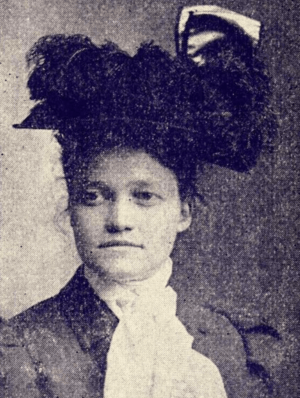Florence Wells Slater facts for kids
Quick facts for kids
Florence Wells Slater
|
|
|---|---|

Slater in 1896
|
|
| Born | October 16, 1864 |
| Died | January 22, 1941 Winston-Salem, North Carolina, U.S.
|
| Resting place | Salem Cemetery |
| Education | St. Mary's School |
| Alma mater | Cornell University |
| Occupation | entomologist, schoolteacher |
| Parent(s) | James Alexander Slater (father) |
Mary Florence Wells Slater (born October 16, 1864 – died January 22, 1941) was an amazing American scientist who studied insects, called an entomologist. She was also a dedicated teacher.
After finishing school at St. Mary's School in 1882, she became a science teacher there. Later, she went to Cornell University to study insects even more. She worked as a helper for a famous insect scientist named John Henry Comstock.
In 1899, Florence Slater wrote an important article. It corrected a mistake in a book by her professor, Mr. Comstock. She then taught science in New York City public schools, especially at Washington Irving High School. Florence Slater also worked hard to get better retirement plans for teachers. She believed in equal pay for equal work, meaning everyone should get paid the same for doing the same job.
Contents
Early Life and Education
Mary Florence Wells Slater was born in Salisbury, North Carolina, on October 16, 1864. Her father was James Alexander Slater. She had three siblings: Ada Slater Carter, James H. Slater, and Henry Fielding Slater.
In 1877, Florence started attending St. Mary's School. This was a boarding school for girls in Raleigh. She graduated from St. Mary's in 1882. The very next year, in 1883, she joined the school's teachers. She taught subjects like botany (the study of plants) and other natural sciences.
Discoveries in Entomology
In 1885, Florence Slater went to Cornell University. There, she joined a science honor society called Sigma Xi. She studied and worked closely with a well-known insect expert, John Henry Comstock.
While working with Mr. Comstock in 1899, she made an important discovery. She wrote an article called The Egg-Carrying Habit of Zaitha. In this article, she explained that male Zaitha flumineum insects carry the eggs. She also found that the female insects actually "capture the male" to lay their eggs on him. This corrected a mistake that had been in American science textbooks for a long time. She also wrote that the male insect seemed to dislike carrying the eggs.
Florence Slater earned her Bachelor of Science degree from Cornell University in 1900.
Teaching Career in New York
After graduating, Florence Slater moved to New York City. She became a science teacher in the city's public schools. Her most notable teaching job was at Washington Irving High School.
While teaching there, she made learning exciting for her students. She would borrow slides from the American Museum of Natural History. She even brought animals from the Bronx Zoo to use in her lessons. Every month, she would arrange for an expert from the American Museum of Natural History to give a talk. These talks were for all 5,000 students in the school auditorium.
Advocating for Teachers
Florence Slater was a strong supporter of teachers' rights. She believed in equal pay for equal work. This means that men and women doing the same job should get the same pay. She also worked hard to get a good retirement system for teachers in New York public schools.
When she retired from teaching, she received a pension. This allowed her to live comfortably and be financially independent. After retiring, she moved back to North Carolina. She continued to share her knowledge by giving guest lectures around the state. A famous educator named Jane Simpson McKimmon attended one of her talks. Florence Slater lectured to over six hundred students from rural North Carolina. She showed them a film called How Life Begins.
Later Life and Legacy
Florence Slater was also a religious person. She was a member of St. Paul's Episcopal Church in Winston-Salem. She also taught bible study classes there.
She passed away on January 22, 1941. She is buried at Salem Cemetery. Florence Slater is remembered for her contributions to science and education. She helped correct scientific understanding and fought for better conditions for teachers.
 | Percy Lavon Julian |
 | Katherine Johnson |
 | George Washington Carver |
 | Annie Easley |

